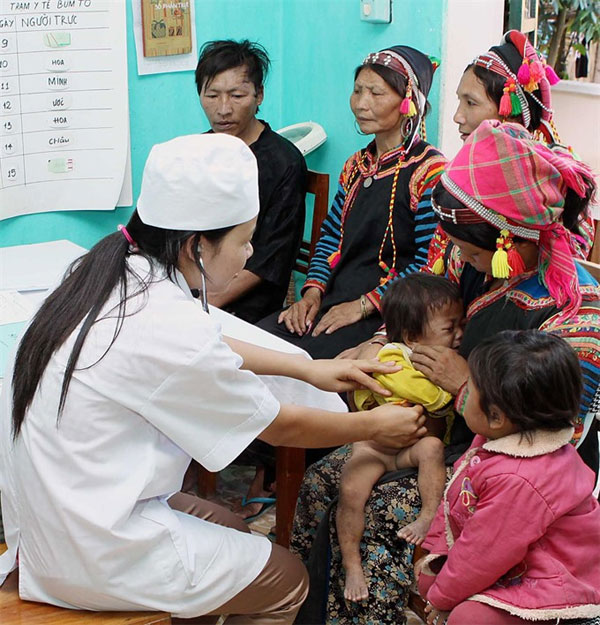VietNamNet Bridge – Doctor Nguyen Chien Quyet completed his first surgery as lead surgeon last Wednesday, performing a hernia operation on a four-year-old Mong ethnic boy, at Bac Ha District General Hospital in the northern mountainous province of Lao Cai.

|
|
A medical worker examines ethnic La Hu minority patients in Bum To Commune, Muong Te District, the northern mountainous province of Lai Chau. – Photo: VNA/VNS |
Quyet has signed up to work at the hospital for three years.
Quyet graduated from the Ha Noi Medical University three years ago and then spent two years studied his speciality – gynaecology.
When he was a final-year student, he heard about a project bringing doctors to volunteer to work in poor district, and he eagerly signed up.
“Now I believe I can give effective heath care to residents in Bac Ha District,” he said.
Quyet was among the first seven doctors on the pilot project sending young doctors to poor districts and island areas.
The pilot project was approved by the Ministry of Health in March 2013.
The seven doctors will go to different poor districts in Lao Cai, Son La, Bac Kan and Dien Bien northern provinces.
Under the project, young doctors who perform well in medical universities and volunteer to join will be chosen.
After being trained for two years in a medical speciality, the male ones will be taken to districts hospital in poor areas for three years, and female doctors for two years.
Pham Van Tac, director of the Personnel Department under the Ministry of Health, said that the project aimed to improve the number and quality of medical staff in disadvantaged areas.
Reports from health departments in poor districts showed that 63 districts needed about 600 doctors for 15 different specialities such as paediatrics, gynaecology and infectious diseases.
Some district hospitals in Binh Dinh, Quang Ngai and Thanh Hoa have only four or five doctors, and some don’t even have one.
Director Tac said that so far 78 doctor volunteers registered for the project. Besides the seven assigned to poor districts, the remainder are being trained.
“Several experts believe that assigning doctor volunteers to poor districts for two or three years is too short. The time is not enough to improve health examination and treatment quality at localities, and was not suitable for preferential policies for doctor volunteers. So the department will consider lengthening the period,” said Tac.
Under the project, the doctors will be provided with priority conditions in terms of salary, allowance and working conditions during and after they complete their missions.
VNS
| related news |